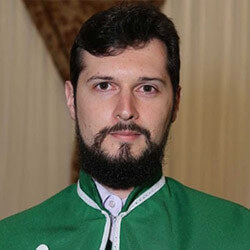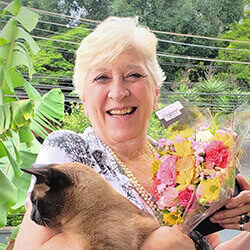Professors

Prof. Dr. Maria Anete Lallo
Coordinator and Full Professor
CNPq Productivity Scholarship – Level 2
Stricto Sensu Graduate Program in Environmental and Experimental Pathology
Universidade Paulista
Street Dr. Bacelar, 1212, São Paulo, SP 04026-002, Brazil
Area of Activity
Veterinarian with projects related to the pathogenic and immunological aspects of opportunistic and emerging infectious diseases such as Giardiasis, Cryptosporidiosis and Microsporidiosis.
Epidemiological approach focused on One Health, integrating issues of animal, human and environmental health in relation to opportunistic diseases.
Has clinical projects involving frequent gastrointestinal infections in small animal clinics.
Evaluates morphofunctional alterations with ticks of importance in animal husbandry and in the transmission of zoonoses.
Review Editor and Guest Editor of international scientific journals.
More information
- Clininfec - Clinic and Infectious Veterinary Diseases
- Biology of Cellular Differentiation and Transformation: Modulation by Endogenous and Exogenous Factors
- Bioethics and Scientific Methodology
- Epidemiology Applied to the Environment and Health Single
- Project Seminars I
- Project Seminars II
- Special Topics Applied to Education
Featured Publications
- Araújo RS, Barbosa MRF, Dropa M, Araujo de Castro VC, Galvani AT, Padula JA, et al. Environmental surveillance of Cryptosporidium and Giardia in surface supply water and treated sewage intended for reuse from an urban area in Brazil. Environ Pollut. 2024;363:125089. doi:10.1016/j.envpol.2024.125089
- Codeceira JF, Alvares-Saraiva AM, Hurtado ECP, Spadacci-Morena DD, Coutinho SD, Lallo MA. Heat-killed Malassezia pachydermatis suspension modulates the activity of macrophages challenged with Encephalitozoon cuniculi. Journal of Medical Mycology. 2023 Mar;33(1):101338. doi: 10.1016/j.mycmed.2022.101338.
- Dalboni LC, Alvares Saraiva AM, Konno FT de C, Perez EC, Codeceira JF, Spadacci-Morena DD, et al. Encephalitozoon cuniculi takes advantage of efferocytosis to evade the immune response. PLOS ONE. 2021 Mar 5;16(3):e0247658. doi: 10.1371/journal.pone.0247658.
- de Oliveira CGN, Perez EC, Alvares-Saraiva AM, Lallo MA. CD8 T lymphocytes from B-1 cell-deficient mice down-regulates fungicidal activity of macrophages challenged with E. Cuniculi. Immunobiology. 2024 Jul;229(4):152827. doi: 10.1016/j.imbio.2024.152827.
- Figuerêdo Moreira I, Marcelino Alvares-Saraiva A, Cristina Pérez E, Guilherme Xavier J, Denelle Spadacci-Morena D, Silva de Araújo R, et al. Opportunistic pneumonia caused by E. cuniculi in mice immunosuppressed with cyclophosphamide. Immunobiology. 2022 May;227(3):152194. doi: 10.1016/j.imbio.2022.152194.
- Hidifira AM, Alvares-Saraiva AM, Perez EC, Spadacci-Morena DD, de Araujo RS, Lallo MA. Increased susceptibility to encephalitozoonosis associated with mixed Th1/Th2 profile and M1/M2 profile in mice immunosuppressed with cyclophosphamide. Experimental Parasitology. 2023 Nov; 254:108606. doi: 10.1016/j.exppara.2023.108606.
- Machado RGP, Coelho HDS, Carvas Júnior N, Cesar AVM, Lallo MA. Influência de aspectos socioeconômicos sobre os indicadores de guarda responsável em cães e gatos em Santana de Parnaíba - SP. Arq Ciênc Vet Zool UNIPAR. 2024;27:76–94.
- Moysés CRS, Alvares-Saraiva AM, Perez EC, Spadacci-Morena DD, Vidôto da Costa LF, Xavier JG, et al. Mice with genetic and induced B-cell deficiency as a model for disseminated encephalitozoonosis. Comparative Immunology, Microbiology and Infectious Diseases. 2022 Feb;81:101742. doi 10.1016/j.cimid.2021.101742.
- Nascimento de Oliveira CG, Alvares-Saraiva AM, Perez EC, Sampaio SC, Lallo MA. Crotoxin modulates Encephalitozoon cuniculi-infected macrophages toward the M1 microbicidal profile. Toxicon. 2025;259:108348. doi:10.1016/j.toxicon.2025.108348.
- Romano F, Lallo MA. Efficacy of a single dose of nitazoxanide in dogs naturally infected with Giardia duodenalis. Research in Veterinary Science. 2023 Jun;159:252–6. doi: 10.1016/j.rvsc.2023.04.022.
- Romano FS, Lallo MA, Romano RS. Fecal microbiota transplantation as a treatment for granulomatous colitis in a French Bulldog: a case report. Microorganisms. 2025;13:366. doi:10.3390/microorganisms13020366.
- Romano F, Xavier JG, Araújo RS, Coutinho SD, Lallo MA. Successful use of albendazole and fenbendazole therapy in a cat with persistent diarrhea due Enterocytozoon bieneusi. Journal of Veterinary Medical Science. 2022;84(6):22–0045. doi: 10.1292/jvms.22-0045.

Prof. Dr. Ivana Barbosa Suffredini
Vice-Coordinator and Full Professor
CNPq Productivity Scholarship – Level 2
Stricto Sensu Graduate Program in Environmental and Experimental Pathology
Universidade Paulista
ivana.suffredini@docente.unip.br
Street Dr. Bacelar, 1212, São Paulo, SP 04026-002, Brazil
Area of Activity
Pharmacist, Prof. Dr. Ivana Suffredini conducts multidisciplinary research in the areas of Pharmacognosy, Pharmacology and Toxicology of Medicinal Plants, Chemistry of Natural Products, Microbiology and Ethnoveterinary Medicine. Her main focus is the “Evaluation of antitumor, antimicrobial and antioxidant activity, general toxicity and behavioral changes of plant extracts and essential oils”, applied to Veterinary and Human Medicine.
Through the study of plant extracts from Brazilian plants from the Amazon Rainforest, the Atlantic Forest and plants from Antarctica, such as bryophytes, she seeks to understand the use of phytotherapeutics and active natural compounds in the context of One Health in in vitro and in vivo models. Prof. Suffredini also works as Review Editor and Guest Editor in international scientific journals.
More information
- Biological, Pharmacological and Toxicological Activities of Natural Products
- Drug Therapy Applied to Health Sciences
- Bioethics and Scientific Methodology
- Veterinary and Human Ethnopharmacology and One Health
- Project Seminars I
- Project Seminars II
- Special Topics Applied to Education
Featured Publications
- Alves CS, Frias HV, Bonamin LV, Correia MSF, Corrêa MG, Bondan EF, et al. Luffa operculata at a late period of gestation dysregulates melatonin and cytokines interfering with weight of dams and their male offspring. J Ethnopharmacol. 2021;275:113867. doi:10.1016/j.jep.2021.113867
- Correia MSF, Saraiva AMA, Hurtado ECP, Paciencia MLB, Konno FTC, Frana SA, Suffredini IB. Calophyllum brasiliense extracts induced apoptosis in human breast adenocarcinoma cells. Eur J Med Plants. 2021;32:50–64. doi:10.9734/ejmp/2021/v32i430384
- Frias HV, Alves CS, Flório JC, Bondan EF, Bonamin LV, Coelho CP, et al. Vertical exposition to Luffa operculataextract deregulates behavior and hypothalamus neurotransmitters in juvenile rats. J Ethnopharmacol. 2021;264:113265. doi:10.1016/j.jep.2020.113265
- Nicolau ALA, Peres GB, Silva JS, Nunes SH, Fortes TML, Suffredini IB. Pilot project. Resveratrol intake by physical active and sedentary older adult women and blood pressure. Exp Gerontol. 2022;166:111883. doi:10.1016/j.exger.2022.111883
- Salzedas BA, Takaki J, Gomes LNA, Castro M, Bueno TA, Suffredini IB. Use of phytotherapy in veterinary gastroenterology and dermatology: a systematic review. Foco (Faculdade Novo Milênio). 2024;17:e5929. doi:10.54751/revistafoco.v17n9-055
- Silva JS, Brandão VR, Coutinho SD, Paciencia MLB, Frana SA, Diaz IEC, Suffredini IB. Antifungal activity of the essential oils of Osteophloeum platyspermum (Myristicaceae) against Malassezia spp. and Candida albicans influenced by seasonality and climatic factors. Eur J Med Plants. 2021;32:31–45. doi:10.9734/ejmp/2021/v32i1230433
- Sousa SRN, Silva JS, Paciencia MLB, Frana SA, Diaz IEC, Suffredini IB. The importance of monoterpenes in the antibacterial activity of Osteophloeum platyspermum essential oils. Eur J Med Plants. 2021;32:112–21. doi:10.9734/ejmp/2021/v32i1230440
- Suffredini IB, Alves CS, Frias HV, Bonamin LV, Bondan EF, Coelho CP, et al. The gestational exposure to Luffa operculata and a late stressor in young Wistar rats induce sex-specific behavioral, inflammatory, and stress hormone responses. Braz J Pharm Sci. 2024;60:1–28. doi:10.1590/s2175-97902024e23474
- Suffredini IB, Alves CS, Frias HV, Bondan EF, Bonamin LV, Coelho CP, et al. Luffa operculata (L.) Cogn. gestational exposition induces anxiety-like behavior and interferes with melatonin and inflammation in young female rats. Pharmacogn Res. 2023;15:524–36. doi:10.5530/pres.15.3.055
- Suffredini IB, Arruda JR, Rodrigues CAFSTP, Carvalho BRR, Rodrigues KFS, Bonamin LV. The Brazilian ethnoveterinary analyzed by the One World-One Health™ perspective. Pharmacogn Rev. 2023;17:1–14.
- Suffredini IB, Silva JS, Frana SA, Pinto KC, Bento KCD, Rüdiger EC, et al. Screening Amazon rainforest plant extracts for antimicrobial activity: a 15-year commitment to the Brazilian biodiversity. Front Antibiot. 2023;2:1122400. doi:10.3389/frabi.2023.1122400
- Teodoro ALS, Ramada MHS, Paciencia MLB, Dohms SM, Camara PSC, Varella AD, et al. Antarctic bryophyte Sanionia uncinata (HEDW.) Loeske, Amblystegiaceae, antimicrobial, antioxidant, cytotoxic, and acetylcholinesterase activities. An Acad Bras Cienc. 2024;96:e20240678. doi:10.1590/0001-3765202420240678
- Varella AD, Suffredini IB, Paciencia MLB, Frana SA, Domingues PC, Saraiva AMA, Hurtado ECP. Ativo de extrato vegetal com vistas ao melhoramento da indução à apoptose contra tumores humanos e veterinários em formulações de uso medicinal. BR1020240091272. 2024.

Prof. Dr. Alessandra Marnie Martins Gomes de Castro
Full Professor
Stricto Sensu Graduate Program in Environmental and Experimental Pathology
Universidade Paulista
alessandra.castro8@docente.unip.br
Street Dr. Bacelar, 1212, São Paulo, SP 04026-002, Brazil
Area of Activity
Veterinarian with experience in Genetics, especially Molecular Genetics of Viruses.
Her research includes:
- Microbiology (emphasis on bacteria and viruses)
- Vaccine development
- Laboratory diagnosis for infectious diseases
She works on vaccine development projects for swine in collaboration with Iowa State University. Prof. Castro is also a Review Editor and Guest Editor for international scientific journals.
More information
Disciplines
- Epidemiology Applied to the Environment and Single Health
- Applied Epigenetics
- Basic Epigenetics I
- Infectious Diseases in the Globalized World
- Special Topics Applied to Education
Featured Publications
Book Chapter
- Karuppannan AK, de Castro AMMG, Opriessnig T. Recent Advances in Veterinary Diagnostic Virology. In: Advanced Techniques in Diagnostic Microbiology. 3rd ed. Cham: Springer International Publishing; 2018. p. 317–44. doi: 10.1007/978-3-319-95111-9_14.
Articles
- Cortez A, Metorima CS, Miyagi SAT, Sousa AO, Peyser AV, Castro AMMG, et al. High genetic diversity of hepatitis E virus in swine in São Paulo State, Brazil. Arq Bras Med Vet Zootec. 2021 Oct;73(5):1237–42. doi:10.1590/1678-4162-12203
- Opriessnig T, Karuppannan AK, Castro AMMG, Xiao CT. Porcine circoviruses: current status, knowledge gaps and challenges. Virus Res. 2020 Sep;286:198044. doi:10.1016/j.virusres.2020.198044
- Opriessnig T, Castro AMMG, Karuppanan AK, Gauger PC, Halbur PG, Matzinger SR, et al. A Porcine circovirus type 2b (PCV2b)-based experimental vaccine is effective in the PCV2b-Mycoplasma hyopneumoniae coinfection pig model. Vaccine. 2019 Oct;37(44):6688–95. doi:10.1016/j.vaccine.2019.09.029
- Opriessnig T, Gauger PC, Gerber PF, Castro AMMG, Shen H, Murphy L, et al. Comparison of the efficacy of a commercial inactivated influenza A/H1N1/pdm09 virus (pH1N1) vaccine and two experimental M2e-based vaccines against pH1N1 challenge in the growing pig model. PLoS One. 2018 Jan 30;13(1):e0191739. doi:10.1371/journal.pone.0191739
- Silva DF, Silva VH, Barros LM, Oliveira TS, Macedo CIS, Mesquita RG, et al. Vaccination strategies to curb environmental spread of Porcine Circovirus 2. S Afr J Anim Sci. 2024;54:503–8.
- Silva RR, Silva DF, Silva VH, Castro AMMG. Porcine circovirus 3: a new challenge to explore. Front Vet Sci. 2024;10:1–12.
- Silva VH, Silva DF, Baldisseri F, Borges JCS, Borba LJ, Silva RR, Castro AMMG. PCV2: the unexpected threat – how fish infection can transform industries and society: a pilot study. S Afr J Anim Sci. 2024;54:93–9.

Prof. Dr. Anuska Marcelino Alvares Saraiva
Full Professor
Stricto Sensu Graduate Program in Environmental and Experimental Pathology
Universidade Paulista
anuska.saraiva@docente.unip.br
Street Dr. Bacelar, 1212, São Paulo, SP 04026-002, Brazil
Area of Activity
Biologist with research analyzing the regulatory role of B-1 cells in diabetes models and their interactions with effector T lymphocytes and regulatory T cells in the context of autoimmunity and metabolic diseases.
She evaluates the regulatory role of B-1 lymphocytes in an experimental model of diabetes and the capacity of this lymphocyte to produce insulin, as well as the potential of cell therapy for the treatment of type 1 diabetes, with metabolic reprogramming of B-1 cells in vitro.
She studies the prevalence of diabetes mellitus among adolescents and the management of lifestyle habits (exercise and diet) to improve the health parameters of this population.
She also collaborates in several studies with an emphasis on the parasite-host relationship, immune response in infections and immune response in tumor models.
She works as Review Editor and Guest Editor of international scientific journals.
More information
- Biology of Cellular Differentiation and Transformation: Modulation by Endogenous and Exogenous Factors
- Clininfec - Veterinary Clinic and Infectious Diseases
- From Cell Culture to Cell Therapy: Fundamentals and Advances
- Scientific Dissemination
- Special Topics Applied to Education
Featured Publications
- Alvares-Saraiva AM, Novo MCT, de Oliveira VC, Maricato JT, Lopes JD, Popi AF, et al. B-1 cells produce insulin and abrogate experimental streptozotocin-induced diabetes. Eur J Immunol. 2015 May 17;45(5):1452–61. doi:10.1002/eji.201445409.
- da Costa LFV, Alvares-Saraiva AM, Dell’Armelina Rocha PR, Spadacci-Morena DD, Perez EC, Mariano M, et al. B-1 cell decreases susceptibility to encephalitozoonosis in mice. Immunobiology. 2017 Feb;222(2):218–27. doi:10.1016/j.imbio.2016.09.018.
- Francisco Neto A, Dell’Armelina Rocha PR, Perez EC, Xavier JG, Peres GB, Spadacci-Morena DD, et al. Diabetes mellitus increases the susceptibility to encephalitozoonosis in mice. PLoS One. 2017 Nov 1;12(11):e0186954. doi:10.1371/journal.pone.0186954.
- Langanke dos Santos D, Alvares-Saraiva AM, Xavier JG, Spadacci-Morena DD, Peres GB, Dell’Armelina Rocha PR, et al. B-1 cells upregulate CD8 T lymphocytes and increase proinflammatory cytokines serum levels in oral encephalitozoonosis. Microbes Infect. 2018 Mar;20(3):196–204. doi:10.1016/j.micinf.2017.11.004.
- Pereira A, Alvares-Saraiva AM, Konno FTC, Spadacci-Morena DD, Perez EC, Mariano M, et al. B-1 cell-mediated modulation of M1 macrophage profile ameliorates microbicidal functions and disrupt the evasion mechanisms of Encephalitozoon cuniculi. PLoS Negl Trop Dis. 2019 Sep 19;13(9):e0007674. doi:10.1371/journal.pntd.0007674.

Prof. Dr. Eduardo Fernandes Bondan
Full Professor
Productivity Scholarship – Level 1C
Stricto Sensu Graduate Program in Environmental and Experimental Pathology
Universidade Paulista
eduardo.bondan@docente.unip.br
Street Dr. Bacelar, 1212, São Paulo, SP 04026-002, Brazil
Area of Activity
Veterinarian with extensive experience in morphology and pathophysiology, with a focus on neurobiology. His main research topics include:
- Glial cells (astrocytes, oligodendrocytes and microglia)
- Demyelination and remyelination
- Chemobrain (post-chemotherapy cognitive dysfunction)
- Neuroinflammation
- Neurodegenerative diseases
- Infectious and parasitic diseases of the nervous system
Develops projects in oncology and veterinary clinic for small and large animals. He also works as Review Editor and Guest Editor in international scientific journals.
More information
- Research Methods in Neuropathology
- Topics in Animal and Comparative Circulatory Pathophysiology
Featured Publications
- Baliellas DEM, Barros MP, Vardaris CV, Guariroba M, Poppe SC, Martins MF, et al. Propentofylline improves thiol-based antioxidant defenses and limits lipid peroxidation following gliotoxic injury in the rat brainstem. Biomedicines. 2023 Jun 7;11(6):1652. doi:10.3390/biomedicines11061652.
- Cardoso CV, de Barros MP, Bachi ALL, Bernardi MM, Kirsten TB, de Fátima Monteiro Martins M, et al. Chemobrain in rats: behavioral, morphological, oxidative and inflammatory effects of doxorubicin administration. Behav Brain Res. 2020 Jan;378:112233. doi:10.1016/j.bbr.2019.112233.
- de Oliveira AS, Convento MB, Razvickas CV, Castino B, Leme AM, da Silva Luiz R, et al. The nephroprotective effects of the allogeneic transplantation with mesenchymal stromal cells were potentiated by ω3 stimulating up-regulation of the PPAR-γ. Pharmaceuticals. 2023 Oct 18;16(10):1484. doi:10.3390/ph16101484.
- Martins-Júnior JL, Bernardi MM, Bondan EF. Propentofylline treatment on open field behavior in rats with focal ethidium bromide-induced demyelination in the ventral surface of the brainstem. Life Sci. 2016 Mar;148:132–8. doi:10.1016/j.lfs.2016.02.028.
- Molina J, Joaquim A, Bonamin LV, Martins MFM, Kirsten TB, Cardoso CV, et al. Reduced astrocytic expression of GFAP in the offspring of female rats that received hypercaloric diet. Nutr Neurosci. 2020 Jun 2;23(6):411–21. doi:10.1080/1028415X.2018.1512783.
- Moretti RL, Dias EN, Kiel SG, Augusto MCM, Rodrigues PS, Sampaio ACS, et al. Behavioral and morphological effects of resveratrol and curcumin in rats submitted to doxorubicin-induced cognitive impairment. Res Vet Sci. 2021 Nov;140:242–50. doi:10.1016/j.rvsc.2021.09.009.
- Ogassawara TB, Joaquim A, Coelho CP, Bernardi MM, Teodorov E, Martins MFM, et al. Food deprivation in F0 generation and hypercaloric diet in F1 generation reduce F2 generation astrogliosis in several brain areas after immune challenge. Int J Dev Neurosci. 2018 Feb 19;64(1):29–37. doi:10.1016/j.ijdevneu.2017.06.003.
- Siqueira RF, Hansen VS, Martins MFM, Leal MLR, Bondan EF. West Nile fever virus infection in horses in São Paulo State, Brazil. Acta Sci Vet. 2022 Jan 1;50. doi:10.22456/1679-9216.117796.
- Suffredini IB, Alves CS, Frias HV, Bonamin LV, Bondan EF, Coelho CP, et al. The gestational exposure to Luffa operculata and a late stressor in young Wistar rats induce sex-specific behavioral, inflammatory, and stress hormone responses. Braz J Pharm Sci. 2024;60. doi:10.1590/s2175-97902024e23474.
- Vazi EPG, Holanda F, Santos NA, Cardoso CV, Martins MFM, Bondan EF. Short-term systemic methotrexate administration in rats induces astrogliosis and microgliosis. Res Vet Sci. 2021 Sep;138:39–48. doi:10.1016/j.rvsc.2021.05.020.

Prof. Dr. Elizabeth Cristina Perez Hurtado
Full Professor
Stricto Sensu Graduate Program in Environmental and Experimental Pathology
Universidade Paulista
elizabeth.hurtado@docente.unip.br
Street Dr. Bacelar, 1212, São Paulo, SP 04026-002, Brazil
Area of Activity
Biomedical with experience in Immunology, Cellular and Molecular Biology and Microbiology, with an emphasis on: tumor immunology, tumor microenvironment, oncological homeopathy, extracellular vesicles and immune response to leishmaniasis and microsporidiosis. She has developed projects investigating the interactions between tumor cells and components of the immune system in the development and progression of cancer in in vivo and in vitro models of melanoma and breast cancer. In recent years, her research has focused on the study of cellular and molecular events triggered by homeopathic preparations of Phytolacca decandra and Viscum album as potential anti-tumor agents or for integrative use in the treatment of cancer, both in the veterinary and human fields. He is a Review Editor and Guest Editor of international and national scientific journals.
More information
- Biology of Cellular Differentiation and Transformation: Modulation by Endogenous and Exogenous Factors
- Clininfec - Veterinary Clinical and Infectious Diseases
- Biological Techniques in Research
- Special Topics Applied to Education
Featured Publications
- Almeida EB, Silva KPH, Paixão V, Amaral JB do, Rossi M, Xavier-Navarro RA, et al. A mixture of polyunsaturated fatty acids ω-3 and ω-6 reduces melanoma growth by inhibiting inflammatory mediators in the murine tumor microenvironment. Int J Mol Sci. 2019 Aug 1;20(15):3765. doi:10.3390/ijms20153765.
- Bejá L, Viração TA, Arjona JC, Kalil SP, Bonamin LV, Perez EC. Homeopathic dilutions of Phytolacca decandrainduce cytotoxicity of human breast adenocarcinoma cells. Int J High Dilution Res. 2023;22(2):22–22. doi:10.51910/ijhdr.v22i2.1365.
- Baltuille PP, Holandino C, Baumgartner S, Silva TC, Bonamin LV, Perez Hurtado EC. In vitro evaluation of the effects of Viscum album homeopathic preparations on murine melanoma cells. Int J High Dilution Res. 2023;22(2):23–23. doi:10.51910/ijhdr.v21i1.1182.
- Carvalho JR, Nascimento ESM, Xavier JG, Banamin LV, Hurtado ECP. Papel do microambiente tumoral no desenvolvimento do melanoma. Vet Notícias. 2015 Sep 21;21(2). doi: 10.14393/VTv21n2a2015.29673.
- Colhado Rodrigues BL, Lallo MA, Perez EC. The controversial role of autophagy in tumor development: a systematic review. Immunol Investig. 2020 May 18;49(4):386–96. doi:10.1080/08820139.2019.1682600.
- Holandino CQ, Baultuille PP, Perez Hurtado EC. Ethanolic extract of Viscum album and its homeopathic potencies: a new therapeutic potential. Int J High Dilution Res. 2024;24(1):35–35. doi: 10.51910/ijhdr.v24i1.1530.
- Perez EC, Xander P, Laurindo MFL, Novaes e Brito RR, Vivanco BC, Mortara RA, et al. The axis IL-10/claudin-10 is implicated in the modulation of aggressiveness of melanoma cells by B-1 lymphocytes. PLoS One. 2017 Nov 16;12(11):e0187333. doi: 10.1371/journal.pone.0187333.
- Pérez EC, Machado J, Aliperti F, Freymüller E, Mariano M, Lopes JD. B-1 lymphocytes increase metastatic behavior of melanoma cells through the extracellular signal-regulated kinase pathway. Cancer Sci. 2008 May 28;99(5):920–8. doi:10.1111/j.1349-7006.2008.00776.x.
- Perez Hurtado EC, Henao Agudelo JS, Foganholi da Silva RA, Viração TA, Fernandes CJDC. The role of extracellular vesicles in cancer. Curr Top Membr. 2024;94:247–85. doi:10.1016/bs.ctm.2024.06.010.
- Staquicini FI, Tandle A, Libutti SK, Sun J, Zigler M, Bar-Eli M, et al. A subset of host B lymphocytes controls melanoma metastasis through a melanoma cell adhesion molecule/MUC18-dependent interaction: evidence from mice and humans. Cancer Res. 2008 Oct 15;68(20):8419–28. doi: 10.1158/0008-5472.CAN-08-1242.
- Silva TC, Holandino C, Pinto SAG, Silvestro DOM, Suffredini IB, Prado PIB, et al. Effects of homeopathic preparations of Viscum album on in vivo murine melanoma model. Int J High Dilution Res. 2023;22(2):24–24. doi:10.51910/ijhdr.v22i2.1364.
- Silva TCD, Santos WAD, Pinto SAG, Rocha PRD, Hurtado ECP, Bonamin LV. Phenotypic changes in mammary adenocarcinoma (4T1) cells in vitro after treatment with Carcinosinum. Homeopathy. 2022 Nov;111(4):278–87. doi: 10.1055/s-0041-1740967.

Prof. Dr. Giovani Bravin Peres
Collaborator Professor
Stricto Sensu Graduate Program in Environmental and Experimental Pathology
Universidade Paulista
Street Dr. Bacelar, 1212, São Paulo, SP 04026-002, Brazil
Area of Activity
Graduated in Biological Sciences - Medical Modality from the Federal University of São Paulo (2009), Master (2012) and Doctor of Sciences (2016) from the Postgraduate Program in Molecular Biology of the same university.
He has experience in:
a) Academic research in the areas of Biochemistry and Molecular Biology, with an emphasis on glycoconjugates;
b) Teaching, teaching from Pre-University to Postgraduate courses and also acting in coordination positions;
c) Collaborative management and business administration.
Works as Review Editor and Guest Editor of international scientific journals.
More information
- Statistics Applied to Research I
- Statistics Applied to Research II
Featured Publications
- Alfredo PP, Johnson MI, Bjordal JM, Santos ATS, Peres GB, Steagall Junior W, et al. Efficacy of diadynamic currents as an adjunct to exercise to manage symptoms of knee osteoarthritis in adults. Clin Rehabil. 2024;38:920–31.
- De Vilhena EC, Coutracos NRT, Coimbra EN, Denez KB, Oliveira AP, Holandino C, et al. Prevalence of COVID-19 complications during a program of homeopathic Camphora officinalis distribution to city populations of Santa Catarina, Brazil: an ecological study. Homeopath. 2024;1.
- Mohammad SN, Pinto AAG, Nagai MO, Coimbra EN, Suffredini IB, Peres GB, et al. Environmental parameters modulate lead chloride toxicity on Artemia salina. Int J High Dilution Res. 2022;21:9–9.
- Mohammad SN, Pinto AAG, Nagai MYO, Coimbra EN, Suffredini IB, Peres GB, et al. Interference of water and environmental variables on lead chloride toxicity in Artemia salina model. Water. 2022;SE:1.
- Nagai MYDO, Mohammad SN, Pinto AAG, Coimbra EN, Peres GB, Suffredini IB, et al. Highly diluted glyphosate mitigates its effects on Artemia salina: physicochemical implications. Int J Mol Sci. 2023;24:9478.
- Pinto S, Nagai MY, Alvares-Saraiva A, Peres GB, Waisse S, Hurtado ECP, et al. Silicea terra and Zincum metallicummodulate the activity of macrophages challenged with BCG in vitro. Homeopathy. 2021;110:52–61.
- Von Ancken A, Peres GB, Coelho CP. Homeopathic preparations and separation anxiety in dogs: a pilot study. Vet Integr Sci. 2022;20:459–73.

Prof. Dr. José Guilherme Xavier
Full Professor
Stricto Sensu Graduate Program in Environmental and Experimental Pathology
Universidade Paulista
Street Dr. Bacelar, 1212, São Paulo, SP 04026-002, Brazil
Area of Activity
Veterinarian with projects in Animal and Comparative Pathology, working mainly on the following topics: comparative oncology; use of morphological, immunological and molecular techniques as diagnostic, prognostic and predictive tools in animal neoplasias; pathology of lymphohematopoietic organs; veterinary dermatopathology and ichthyopathology.
Review Editor and Guest Editor of international scientific journals.
More information
- Biology of Cellular Differentiation and Transformation: Modulation by Endogenous and Exogenous Factors
- Structural and Functional Ecology of Ecosystems
- Topics in Tumor Biology
- Special Topics Applied to Education
Featured Publications
- Araújo BL, Serantoni Moyses CR, Spadacci-Morena DD, Xavier JG, Lallo MA. White spots amidst the gold: ultrastructural and histological aspects of the chronic inflammatory response of goldfish with ichthyophthiriasis. J Comp Pathol. 2024 May; 211:21–5. doi: 10.1016/j.jcpa.2024.04.003.
- Barra CN, Macedo BM, Cadrobbi KG, Pulz LH, Huete GC, Kleeb SR, et al. Apoptotic intrinsic pathway proteins predict survival in canine cutaneous mast cell tumours. Vet Comp Oncol. 2018 Mar;16(1). doi: 10.1111/vco.12330.
- Daniel J, Barra CN, Pulz LH, Kleeb SR, Xavier JG, Catão-Dias JL, et al. Intratumoral collagen index predicts mortality and survival in canine cutaneous mast cell tumours. Vet Dermatol. 2019 Apr;30(2):162. doi: 10.1111/vde.12726.
- De Nardi AB, Costa MT, Amorim RL, Vasconcelos RO, Dagli MLZ, Rocha NS, et al. Brazilian consensus for the diagnosis, treatment and prognosis of cutaneous mast cell tumors in dogs. Investigação. 2018;17(1). doi: 10.26843/investigacao.v17i1.1837.
- Joselevitch JA, Vargas THM, Pulz LH, Cadrobbi KG, Huete GC, Nishiya AT, et al. High lysyl oxidase expression is an indicator of poor prognosis in dogs with cutaneous mast cell tumours. Vet Comp Oncol. 2023 Sep;21(3):401–5. doi: 10.1111/vco.12898.
- Joselevitch JA, Barra CN, Vargas THM, Pulz LH, Nishiya AT, Kleeb SR, et al. Nanog expression and proliferation indices in canine cutaneous mast cell tumors. Vet Pathol. 2018 Nov;55(6):849–52. doi: 10.1177/0300985818789470.
- Nishiya AT, Nagamine MK, Fonseca IIM, Miraldo AC, Villar Scattone N, Guerra JL, et al. Inhibitory effects of a reengineered anthrax toxin on canine oral mucosal melanomas. Toxins (Basel). 2020 Mar;12(3):157. doi: 10.3390/toxins12030157.
- Silva JG da, Salzedas BA, Xavier JG. Emprego da histopatologia no diagnóstico diferencial de lesões nodulares esplênicas em cães submetidos à esplenectomia. Rev Foco. 2024 Oct;17(10):e6566. doi: 10.54751/revistafoco.v17n10-101.
- Vargas THM, Barra CN, Pulz LH, Huete GC, Cadrobbi KG, Nishiya AT, et al. Galectin-3 immunolabelling correlates with BCL2 expression in canine cutaneous mast cell tumours. Acta Vet Hung. 2021 Jul;69(2):169–74. doi: 10.1556/004.2021.00019.
- Yasumaru CC, Xavier JG, Strefezzi RDF, Salles-Gomes COM. Intratumoral T-lymphocyte subsets in canine oral melanoma and their association with clinical and histopathological parameters. Vet Pathol. 2021 May;58(3):491–502. doi: 10.1177/0300985821999321.

Prof. Dr. Leoni Villano Bonamin
Full Professor
CNPq Productivity Scholarship – Level 2
Stricto Sensu Graduate Program in Environmental and Experimental Pathology
Universidade Paulista
Street Dr. Bacelar, 1212, São Paulo, SP 04026-002, Brazil
Area of Activity
Veterinarian with projects related to the effects of high dynamized dilutions on living systems and their correlations with physical-chemical aspects of such preparations. The focus of the research is to understand the mechanisms of action involved and explore all possible uses, both in veterinary clinics (through homeopathic medicines) and in food production, recovery of degraded environments and vector control in wild environments (through dynamized inputs for agricultural use).
Main projects: homeopathy and environmental health; correlations between physical-chemical aspects of high dilutions and their biological and clinical effects.
President (2002-2008) and Vice-President (2008-2014) of GIRI (Groupe International de Recherche sur l’Infinitésimal).
Deputy Editor of the journal Homeopathy – The Journal of the Faculty of Homeopathy – London since 2015.
Editor-in-Chief of the journal International Journal of High Dilution Research (IJHDR) since 2019.
Member of the core group of researchers associated with the World Water Lab since 2022.
Member of the Permanent Commission of Homeopathy of CRMV-SP since 2023.
More information
- Biology of Cellular Differentiation and Transformation: Modulation by Endogenous and Exogenous Factors
- Experimental and Environmental Neuropsychopharmacology
- Water and Biological Self-Organization
- Referata in Environmental and Experimental Pathology
- Susceptibility and Complexity in the Single Health Approach
- Special Topics Applied to Education
Featured Publications
Organized Book:
- Aleixo D, Baumgartner S, Ciuppa L, Paiva JP de, Homsani F, Araujo SM, et al. Transdisciplinarity and Translationality in High Dilution Research. 1st ed. Vol. 1. 2019.
Articles Published in Scientific Journals:
- Aparicio ACC, de Oliveira LHS, Silva JS, Coelho CP, Pinheiro SR, Souza MF, et al. Interaction between solvatochromic dyes and water sampled from a natural source treated with high dilutions of phosphorus. Homeopathy. 2020 Aug 12;109(3):126–32. doi: 10.1055/s-0039-3400255.
- de Medeiros NSS, Pinto AAG, Frana S, Souza MF, Suffredini IB, Cartwright SJ, et al. Solvatochromic dyes track a homeopathic preparation through water-stream systems in a program to control tick infestation at a wild animal rehabilitation center in Brazil. Homeopathy. 2024 Sep 9. doi: 10.1055/s-0044-1787783.
- de Santana FR, Dalboni LC, Nascimento KF, Konno FT, Alvares-Saraiva AM, Correia MSF, et al. High dilutions of antimony modulate cytokines production and macrophage – Leishmania (L.) amazonensis interaction in vitro. Cytokine. 2017 Apr; 92:33–47. doi: 10.1016/j.cyto.2017.01.004.
- Endler PC, Thieves K, Reich C, Matthiessen P, Bonamin L, Scherr C, et al. Repetitions of fundamental research models for homeopathically prepared dilutions beyond 10⻲³: a bibliometric study. Homeopathy. 2010 Jan;99(1):25–36. doi: 10.1016/j.cyto.2017.01.004.
- Mohammad SN, Pinto AAG, Silva RA da, Suffredini IB, Tournier AL, Cartwright SJ, et al. Environmental homeopathy: homeopathic potencies regulate the toxicity and growth of Raphidiopsis raciborskii (cyanobacteria) and can be tracked physico-chemically. Part 1: biological results. Homeopathy. 2024 May 6. doi: 10.1055/s-0044-1780526.
- Mohammad SN, Pinto AAG, Silva RA da, Suffredini IB, Tournier AL, Cartwright SJ, et al. Environmental homeopathy: homeopathic potencies regulate the growth and toxicity of Raphidiopsis raciborskii (cyanobacteria) and can be tracked physico-chemically. Part 2: physico-chemical results. Homeopathy. 2024 May 6. doi: 10.1055/s-0044-1780527.
- Nagai MYD de O, Mohammad SN, Pinto AAG, Coimbra EN, Peres GB, Suffredini IB, et al. Highly diluted glyphosate mitigates its effects on Artemia salina: physicochemical implications. Int J Mol Sci. 2023 May 30;24(11):9478. doi: 10.3390/ijms24119478.
- Pinto AAG, Nagai MYD de O, Coimbra EN, Mohammad SN, Silva JS, von Ancken A, et al. Bioresilience to mercury chloride of the brine shrimp Artemia salina after treatment with homeopathic Mercurius corrosivus. Homeopathy. 2021 Nov 2;110(4):244–55. doi: 10.1055/s-0041-1729562.
- Tournier AL, Bonamin LV, Buchheim-Schmidt S, Cartwright S, Dombrowsky C, Doesburg P, et al. Scientific guidelines for preclinical research on potentised preparations manufactured according to current pharmacopoeias—the PrePoP guidelines. J Integr Med. 2024 Sep;22(5):533–44. doi: 10.1016/j.joim.2024.06.005.

Prof. Dr. Maria Martha Bernardi
Full Professor
Productivity Scholarship – Level 1A
Stricto Sensu Graduate Program in Environmental and Experimental Pathology
Universidade Paulista
maria.bernardi@docente.unip.br
Street Dr. Bacelar, 1212, São Paulo, SP 04026-002, Brazil
Area of Activity
Biologist, graduated from the University of São Paulo, works in the areas of Pharmacology, Toxicology and Neuroscience.
Her research is related to Developmental Toxicology and Neuroscience and Behavior.
She studies the changes promoted in the perinatal period by immune system modulators, obesity, medications, heavy metals, pesticides and endocrine disruptors, with a view to investigating behavioral, endocrine, epigenetic and molecular aspects and the development of animal models of mental disorders.
She is the leader-coordinator of the CNPq Research Group on Experimental and Environmental Neuropsychopharmacology and a member of the Plastics Working Group of the Brazilian Academy of Sciences (ABC).
She is a Review Editor and Guest Editor of international scientific journals.
More information
- Bioethics and Methodology of Scientific Research
- Special Topics Applied to Education
- Developmental and Reproductive Toxicology
Featured Publications
- Bernardi MM, Macrini DJ, Rodrigues P da S, Kirsten TB, Chaves-Kirsten GP, Florio JC, et al. Overweight induced by hypernutrition in juvenile rats dysregulates the central monoamines in the adult age. Psychol Neurosci. 2021 Mar;14(1):34–48. doi: 10.1037/pne0000204.
- Cordeiro F, Ceglio F, Galvão N, Bonamin L, Bondan EF, Kirsten TB, et al. Does a therapeutical dose of ivermectin impair testicular homeostasis of rats via excessive apoptosis? Veterinaria Italiana. 2023. doi: https://doi.org/10.12834/Vetit.2692.19722.2.
- de Oliveira-Higa MA, da Silva Rodrigues P, Sampaio ACS, de Camargo Coque A, Kirsten TB, Massironi SMG, et al. The dopaminergic D1 receptor modulates the hyperactivity of Bapa mutant mice. Behav Brain Res. 2023 Aug; 452:114562. doi: 10.1016/j.bbr.2023.114562.
- Gonçalves FB, Garcia-Gomes MSA, Silva-Sampaio AC, Kirsten TB, Bondan EF, Sandini TM, et al. Progressive tremor and motor impairment in seizure-prone mutant tremor mice are associated with neurotransmitter dysfunction. Behav Brain Res. 2023 Apr; 443:114329. doi: 10.1016/j.bbr.2023.114329.
- Medeiros L da S, Rodrigues P da S, Santos DNL, Silva-Sampaio AC, Kirsten TB, Suffredini IB, et al. Prenatal restraint stress downregulates the hypothalamic kisspeptidergic system transcripts genes, reduces the estrogen plasma levels, delayed the onset of puberty, and reduced the sexual behavior intensity in female rats. Physiol Behav. 2023 Mar; 260:114055. doi: 10.1016/j.physbeh.2022.114055.
- Rodrigues P da S, Sampaio ACS, Silva ÉP da, Suffredini IB, Bondan EF, Bernardi MM, et al. Sexual motivation and performance in sexual naïve and experienced rats treated with ivermectin: an ultrasonic vocalization study. Portal Regional da BVS. 2023 Mar; doi: https://doi.org/10.11606/issn.1678-4456.bjvras.2023.198441.
- Schatzer CA de F, Milazzotto MP, Júnior AR dos S, Cerchiaro G, Bernardi MM, Teodorov E. Microencapsulation of sunscreen reduces toxicity of its components to A. salina: biochemical, behavioral, and morphological studies. Ecotoxicol Environ Saf. 2024 Aug;281. doi: 10.1016/j.ecoenv.2024.116586.

Prof. Dr. Rodrigo Augusto Foganholi da Silva
Full Professor
CNPq Productivity Scholarship – Level 2
Stricto Sensu Graduate Program in Environmental and Experimental Pathology
Universidade Paulista
rodrigo.silva3@docente.unip.br
Street Dr. Bacelar, 1212, São Paulo, SP 04026-002, Brazil
Area of Activity
Biologist with projects related to the involvement of epigenetic mechanisms applied to the transcriptional control of multifactorial diseases of human and veterinary interest.
A basic approach focused on the search for biomarkers of interest for One Health and better elucidation of the molecular mechanisms related to neuroprotection.
Has experimental projects involving animal models related to neuroinflammation and the application of epigenetic analyses in animal health.
Hers main focus is the characterization of the neuroprotective effect and the involvement of DNA methylation in transcriptional control.
Review Editor and Guest Editor of international scientific journals.
More information
- Applied Epigenetics
- Basic Epigenetics
- Research methods in neuropathology
- Special Topics Applied to Education
Featured Publications
- Assis RIF, Feltran G da S, Silva MES, Palma IC do R, Rovai ES, Miranda TB de, et al. Non-coding RNAs repressive role in post-transcriptional processing of RUNX2 during the acquisition of the osteogenic phenotype of periodontal ligament mesenchymal stem cells. Dev Biol. 2021 Feb; 470:37–48. doi: 10.1016/j.ydbio.2020.10.012.
- Carvalho LB, dos Santos Sanna PL, dos Santos Afonso CC, Bondan EF, da Silva Feltran G, Ferreira MR, et al. MicroRNA biogenesis machinery activation and lncRNA and REST overexpression as neuroprotective responses to fight inflammation in the hippocampus. J Neuroimmunol. 2023 Sep; 382:578149. doi: 10.1016/j.jneuroim.2023.578149.
- Costa MR, dos Santos AYI, de Miranda TB, Aires R, de Camargo Coque A, Hurtado ECP, et al. Impact of neuroinflammation on epigenetic transcriptional control of Sonic Hedgehog members in the central nervous system. Brain Res. 2023 Jan; 1799:148180. doi: 10.1016/j.brainres.2022.148180.
- da Silva RA, da S. Feltran G, da C. Fernandes CJ, Zambuzzi WF. Osteogenic gene markers are epigenetically reprogrammed during contractile-to-calcifying vascular smooth muscle cell phenotype transition. Cell Signal. 2020 Feb; 66:109458. doi: 10.1016/j.cellsig.2019.109458.
- da Silva RA, Fernandes CJ da C, Feltran G da S, Gomes AM, de Camargo Andrade AF, Andia DC, et al. Laminar shear stress-provoked cytoskeletal changes are mediated by epigenetic reprogramming of TIMP1 in human primary smooth muscle cells. J Cell Physiol. 2019 May 21;234(5):6382–96. doi: 10.1002/jcp.27374.
- Lemes dos Santos Sanna P, Bernardes Carvalho L, Cristina dos Santos Afonso C, de Carvalho K, Aires R, Souza J, et al. Adora2A downregulation promotes caffeine neuroprotective effect against LPS-induced neuroinflammation in the hippocampus. Brain Res. 2024 Jun; 1833:148866. doi: 10.1016/j.brainres.2024.148866.
- Patricia da Silva E, da Silva Feltran G, Alexandre Alcântara dos Santos S, Cardoso de Oliveira R, Assis RIF, Antônio Justulin Junior L, et al. Hyperglycemic microenvironment compromises the homeostasis of communication between the bone-brain axis by the epigenetic repression of the osteocalcin receptor, Gpr158 in the hippocampus. Brain Res. 2023 Mar; 1803:148234. doi: 10.1016/j.brainres.2023.148234.
- Pinto TS, Feltran G da Silva, Fernandes CJ da C, de Camargo Andrade AF, Coque A de C, Silva SL, et al. Epigenetic changes in shear-stressed endothelial cells. Cell Biol Int. 2024 May 29;48(5):665–81. doi: 10.1002/cbin.12138.
- Remor AP, da Silva RA, de Matos FJ, Glaser V, de Paula Martins R, Ghisoni K, et al. Chronic Metabolic Derangement-Induced Cognitive Deficits and Neurotoxicity Are Associated with REST Inactivation. Mol Neurobiol. 2019 Mar 14;56(3):1539–57. doi: 10.1007/s12035-018-1175-9.

Prof. Dr. Thiago Berti Kirsten
Full Professor
Stricto Sensu Graduate Program in Environmental and Experimental Pathology
Universidade Paulista
thiago.kirsten@docente.unip.br
Street Dr. Bacelar, 1212, São Paulo, SP 04026-002, Brazil
Area of Activity
Biologist with a postgraduate degree in veterinary medicine and leader of the Psychoneuroimmunology Laboratory and the CNPq Research Group: Experimental and Environmental Neuropsychopharmacology.
He has experimental projects in the areas of Experimental Models of Behavioral and Psychiatric Disorders and Developmental Studies, topics for which he was awarded the 'CAPES Thesis Award' and the 'USP Outstanding Thesis Award'.
He also works in the area of ​​Ecotoxicology, with emphasis on studies with microplastics.
He has experience in other scientific/therapeutic areas: Environmental Pathology, Mental Health, Neuroscience, Animal Behavior, Animal Models and Perinatal Studies.
Review Editor and Guest Editor of international scientific journals.
More information
- Scientific Dissemination
- Experimental Models in Laboratory Animal Behavior
- Referratas in Environmental and Experimental Pathology
- Special Topics Applied to Education
Featured Publications
- Chiminazzo LLW, Kirsten TB. Psychomotor and neurofunctional aspects after COVID-19. Acta Neuropsychiatrica. 2023 Oct 6;35(5):292–302. doi: 10.1017/neu.2023.2.
- Galvão NA, Cordeiro F, Bernardi MM, Kirsten TB. Ivermectin prevents stress-induced testicular damage in juvenile rats. Tissue Cell. 2024 Feb; 86:102292. doi: 10.1016/j.tice.2023.102292.
- Kirsten TB, Silva EP, Biondi TF, Rodrigues PS, Cardoso Cv, Massironi SMG, et al. Bate palmas mutant mice as a model of Kabuki syndrome: Higher susceptibility to infections and vocalization impairments? J Neurosci Res. 2022 Jul;100(7):1438–51. doi: 10.1002/jnr.25050.
- Kirsten TB, Cabral D, Galvão MC, Monteiro R, Bondan EF, Bernardi MM. Zinc, but not paracetamol, prevents depressive-like behavior and sickness behavior, and inhibits interferon-gamma and astrogliosis in rats. Brain Behav Immun. 2020 Jul; 87:489–97. doi: 10.1016/j.bbi.2020.01.019.
- Kirsten TB, Casarin RC, Bernardi MM, Felicio LF. Pioglitazone abolishes autistic-like behaviors via the IL-6 pathway. PLoS One. 2018 May 23;13(5):e0197060. doi: 10.1371/journal.pone.0197060.
- Kirsten TB, Chaves-Kirsten GP, Bernardes S, Scavone C, Sarkis JE, Bernardi MM, et al. Lipopolysaccharide exposure induces maternal hypozincemia, and prenatal zinc treatment prevents autistic-like behaviors and disturbances in the striatal dopaminergic and mTOR systems of offspring. PLoS One. 2015 Jul 28;10(7):e0134565. doi: 10.1371/journal.pone.0134565.
- Leme E, Silva EP, Rodrigues PS, Silva IR, Martins MFM, Bondan EF, et al. Billings reservoir water used for human consumption presents microbiological contaminants and induces both behavior impairments and astrogliosis in zebrafish. Ecotoxicol Environ Saf. 2018 Oct; 161:364–73. doi: 10.1016/j.ecoenv.2018.06.009.
- Parisi DP, Santos SAR, Cabral D, Queiroz-Hazarbassanov N, Flório JC, Bernardi MM, et al. Therapeutical doses of ivermectin and its association with stress disrupt motor and social behaviors of juvenile rats and serotonergic and dopaminergic systems. Res Vet Sci. 2019 Jun; 124:149–57. doi: 10.1016/j.rvsc.2019.03.009.

Prof. Dr. Welber Senteio Smith
Full Professor
Stricto Sensu Graduate Program in Environmental and Experimental Pathology
Universidade Paulista
Street Dr. Bacelar, 1212, São Paulo, SP 04026-002, Brazil
Area of Activity
Biologist, with projects related to the Functional and Structural Ecology of Freshwater Ecosystems, with an emphasis on Neotropical fish.
Approach to Environmental Sciences focused on One Health, integrating issues of microplastic pollution, among other impacts on different biological groups.
Has projects involving autoecology, endangered species, monitoring and assessment of aquatic biota.
Evaluates the biology, ecology and conservation of aquatic biota.
Review Editor and Guest Editor of international scientific journals.
More information
- Biology and Ecology Applied to Freshwater Aquatic Organisms
- Fundamentals and Current Affairs in Environmental Sciences
- Special Topics Applied to Education
Featured Publications
- de Paiva FC, da Silva Oliveira J, Rani-Borges B, Ando RA, Smith WS. Evaluation of microplastic pollution in gills of freshwater fish in a neotropical hydrographic basin, Brazil. Water Air Soil Pollut. 2024 Oct 12;235(10):677. doi: 10.1007/s11270-024-07492-9.
- França MV, Shimabukuro EM, Fushita ÂT, Smith WS, Benassi RF, Cunha DGF, et al. Structural characteristics of tropical headwater streams draining native vegetation and sugarcane cultivation. Limnologica. 2023 Jul; 101:126099. doi: 10.1016/j.limno.2023.126099.
- Pelicice FM, Agostinho AA, Alves CBM, Arcifa MS, Azevedo-Santos VM, Brito MFG, et al. Unintended consequences of valuing the contributions of non-native species: misguided conservation initiatives in a megadiverse region. Biodivers Conserv. 2023 Oct 15;32(12):3915–38. doi: 10.1007/s10531-023-02666-z.
- Rodrigues KFS, Rani-Borges B, Ando RA, Suffredini IB, Smith WS. Presence of microplastics in workers of Apis mellifera (Linnaeus, 1758) in different landscapes in Brazil. Water Air Soil Pollut. 2024 Sep 7;235(9):593. doi: 10.1007/s11270-024-07395-9.
- Rodrigues KFS, Smith WS. Assessment of potentially toxic metals in water, sediment, and the tissues of seven important fish species from neotropical Brazilian river. Neotrop Ichthyol. 2022;20(4). doi: 10.1590/1982-0224-2021-0155.
- Silva FL da, Stefani MS, Smith W, Schiavone DC, Cunha-Santino MB da, Bianchini Jr I. An applied ecological approach for the assessment of anthropogenic disturbances in urban wetlands and the contributor river. Ecological Complexity. 2020 Aug; 43:100852. doi: 10.1016/j.ecocom.2020.100852.
- Smith WS, Santos TMR, Miranda JF de CT, Cavallari DE, Oliveira J da S, Hernandes R, et al. River dams, free stretches and migratory fish species: a review of the state of the art in the state of São Paulo, Brazil. Braz J Biol. 2024;84. doi: 10.1590/1519-6984.281076.
- Soinski TA, Gato C de S, Matsumoto AA, Brazão ML, Smith WS. Dredging on water bodies and margin interventions: effects on fish. Boletim Inst Pesca. 2022 Aug 8;48. doi: 10.20950/10.20950/1678-2305/bip.2022.48.e641.
- Tonella LH, Ruaro R, Daga VS, Garcia DAZ, Vitorino OB, Lobato-de Magalhães T, et al. Neotropical freshwater fishes: a dataset of occurrence and abundance of freshwater fishes in the Neotropics. Ecology. 2023 Apr 27;104(4). doi: 10.1002/ecy.3713.
- Vieira TB, Sánchez-Botero JI, Garcez DS, Lima SMQ, Pavanelli CS, Casatti L, et al. Spatial non-stationarity in the distribution of fish species richness of tropical streams. Community Ecology. 2023 Apr 22;24(1):35–45. doi: 10.1007/s42974-022-00121-7.
CNPq Productivity Scholarships
Process 306823/2023-3 (validity: 2024-2028).
Topic: Study of the morphological, behavioral and epigenetic effects of doxorubicin administration during childhood, treated or not with resveratrol or curcumin and evaluated in adulthood.
Professor. Dr. Eduardo Fernandes Bondan.
Process 309628/2021-0 (validity: 2021-2024).
Topic: Prospecting for plant active ingredients against pathogens of veterinary interest.
Professor. Dr. Ivana Barbosa Suffredini.
Process 304778/2017-6 (validity: 2018-2021).
Topic: Mechanisms involved in the effects of high dilutions of antimony on experimental infection by Leishmania (L.) amazonensis in vitro.
Professor. Dr. Leoni Villano Bonamin.
Process 303949/2023-26 (validity: 2024-2026).
Topic: Characterization and analysis of the activity of extracellular vesicles of B-1 cells on macrophages challenged with Encephalitozoon cuniculi.
Professor Dr. Maria Anete Lallo.
Process 302401/2019-9 (validity: 2019-2024).
Topic: Transgenerational effects of paternal exposure of rats to ivermectin.
Professor Dr. Maria Martha Bernardi.
Process 301498/2022-93 (validity: 2023-2026).
Topic: Application of circulating neopterin concentration as a prognostic biomarker in Neurocryptococcosis.
Professor Dr. Rodrigo Augusto Foganholi da Silva.
Accreditation and Deaccreditation of NDP Members
The criteria for the accreditation of PPG professors are:
Intellectual Production: The lecturer must demonstrate consistent and qualified intellectual production over the last four years, with an average index equivalent to Qualis A1 ≥ 2.5/year, according to the CAPES Qualis classification. For this purpose, the following are taken into account - Works published or accepted for publication in full, in journals classified in the A1, A2, A3, A4 and A5 strata, with a minimum average of 2.0 points over the last three years, considering the year of the application and the three immediately preceding years. The scores will be determined on the basis of the CAPES rules in force at the time of accreditation, and currently the weights for the classifications are as follows: A1 (JCR or CiteScore >87.5) = 1.0 point; A2 (JCR or CiteScore >75) = 0.75 points; A3 (JCR or CiteScore >62.5)= 0.625 points; A4 (JCR or CiteScore >50) = 0.50 points; A5 (JCR or CiteScore >37.5) = 0.375 points; A6 (JCR or CiteScore >25) = 0.25 points; A7 (JCR or CiteScore >12.5) = 0.125 points and A8 (JCR or CiteScore 0.001) = 0.06. When calculating the index, only scientific publications in the A1 to A5 strata of CAPES Qualis will be considered.
Additional Score (Optional): The following items may be considered as an additional score for calculating the index: international or national patent filed, granted or licensed in the last four years; FAPESP or CNPq Universal Scholarship Report, extension project registered at UNIP, with active or completed extension activity, awarded at least one extension scholarship in the last four years. If the journal does not have a Qualis classification, the score will be decided by the PPG-PAE Committee.
Disaccreditation of lecturers will occur if the lecturer fails to meet two or more of the following requirements: failure to provide data for the Annual Report within the stipulated timeframe; failure to offer or participate in Program courses per academic year (except for official leave of more than 1 year); failure to carry out at least two internationalization activities in the four-year period; internationalization activities include: participation in an international congress, publication of scientific articles with an international author, collaboration with international researchers, among others; not supervising at least 3 undergraduate students in the four-year period (scientific initiation, TCC, monitoring, etc. ); not presenting scientific publications as required; not taking part in events coordinated by the PPG-PAE without justification; exceeding the deadline for defending a dissertation or thesis. These criteria aim to ensure that the PPG-PAE teaching staff remains qualified and engaged, promoting an academic environment of excellence for the training of our students.
